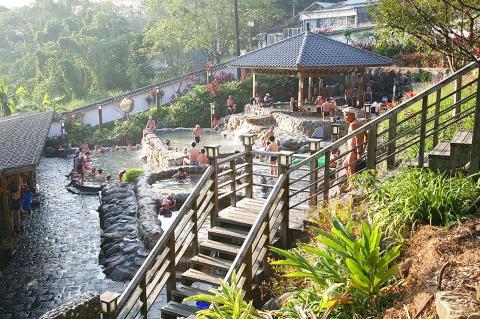The Tourism Bureau yesterday unveiled a list of top 10 hot springs in the nation, adding that it would market those that made it to the top five to international tourists.
The top 10 are: Guanzihling (關子嶺) in Tainan; Xinbeitou (新北投) in Taipei; Jiaosi (礁溪) in Yilan; Guguan (谷關) in Taichung; Jhihben (知本) in Taitung County; Tai’an (泰安) in Miaoli County; Jinshan (金山) Wanli (萬里) and Wulai (烏來) in New Taipei City; Rueisuei (瑞穗) in Hualien County and Baolaibulao (寶來不老) in Kaohsiung.
Hot springs in Xinbeitou and Jiaosi were tied at No. 2.

Photo courtesy of Tourism Bureau
The bureau’s domestic travel section chief Su Yu-hung (蘇宇宏) said that this is the first time that the bureau has evaluated the hot springs in the nation and compiled a Top 10 list.
Su said that the list was determined in two phases. During the first phase, which was from Nov. 1 last year to Jan. 10, members of the public were asked to vote for their favorite hot springs.
Results at this stage accounted for 70 percent of the overall score, he said.
Independent experts were then invited to evaluate the hot springs at the second stage. They examined them based on seven major criteria, which included water quality, safety and hygiene, and creative tour arrangements.
The hot springs that made it to the top five were those that received the highest scores among the hot springs in the south, the north, the east and in central Taiwan, Su said.
The bureau said that each hot spring varies in water quality, history and culture.
For example, Xinbeitou was the first hot spring area in Taiwan, it said, adding that hot springs there can be divided into three categories: those containing white sulphur, blue sulphur and iron sulphur.
The area can also be accessed by the Taipei Mass Rapid Transit System.
Guanzihling is the nation’s only mud springs, the bureau said.
Hot springs operators there have succeeded in combining mud springs tours with the delicious food and coffee produced in Dongshan (東山), the bureau said.
Visitors to Guguan can also see pine trees that are hundreds of years old and experience the Atayal culture, it added.
Visitors to Jiaosi can enjoy hot spring tours and farm produce irrigated by the hot spring waters, the bureau said.
Hot spring operators in Jhihben have turned the town into a holiday resort, where people can bath in the hot springs, walk in the forest and sample traditional Puyuma dishes.

The Sports Administration yesterday demanded an apology from the national table tennis association for barring 17-year-old Yeh Yi-tian (葉伊恬) from competing in the upcoming World Table Tennis (WTT) United States Smash tournament in Las Vegas this July. The sports agency said in a statement that the Chinese Taipei Table Tennis Association (CTTTA) must explain to the public why it withdrew Yeh from the WTT tournament in Las Vegas. The sports agency said it contacted the association to express its disapproval of the decision-making process after receiving a complaint from Yeh’s coach, Chuang

The Hualien Branch of the High Court today sentenced the main suspect in the 2021 fatal derailment of the Taroko Express to 12 years and six months in jail in the second trial of the suspect for his role in Taiwan’s deadliest train crash. Lee Yi-hsiang (李義祥), the driver of a crane truck that fell onto the tracks and which the the Taiwan Railways Administration's (TRA) train crashed into in an accident that killed 49 people and injured 200, was sentenced to seven years and 10 months in the first trial by the Hualien District Court in 2022. Hoa Van Hao, a

Control Yuan Secretary-General Lee Chun-yi (李俊俋) tendered his resignation last night, admitting that he had misused a government vehicle, as reported by media. His resignation was immediately accepted by the Control Yuan. In a statement explaining why he had resigned, Lee apologized for using a Control Yuan vehicle to transport his dog to a pet grooming salon on May 20. The issue first came to light late last month, when TVBS News reported that Lee had instructed his driver to take the dog to the salon. The news channel broadcast photos that it said were taken by an unnamed whistle-blower, which purportedly showed the

Taipei has once again made it to the top 100 in Oxford Economics’ Global Cities Index 2025 report, moving up five places from last year to 60. The annual index, which was published last month, evaluated 1,000 of the most populated metropolises based on five indices — economics, human capital, quality of life, environment and governance. New York maintained its top spot this year, placing first in the economics index thanks to the strength of its vibrant financial industry and economic stability. Taipei ranked 263rd in economics, 44th in human capital, 15th in quality of life, 284th for environment and 75th in governance,